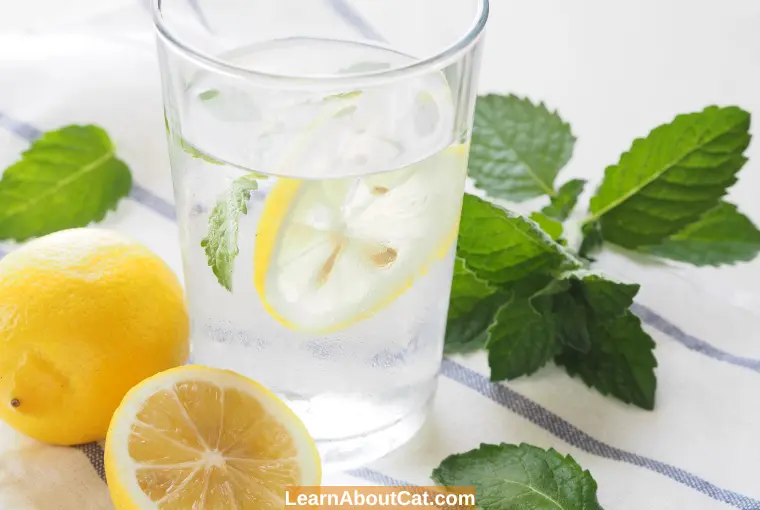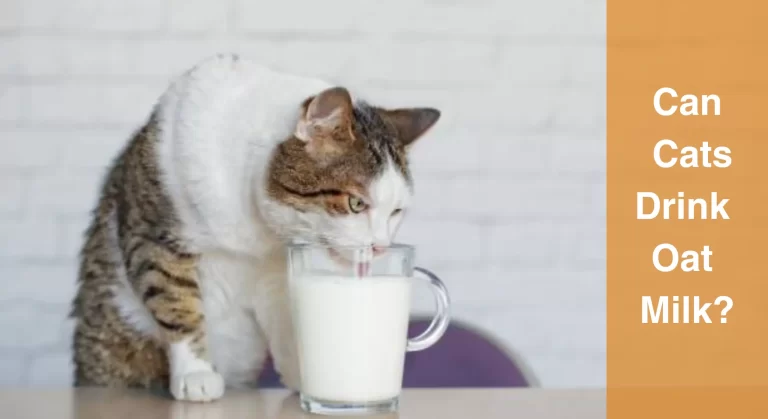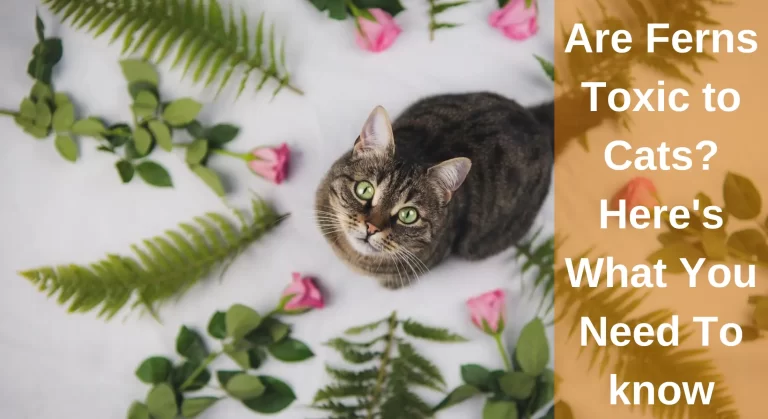Can Cats Drink Lemon Water? Can Cats Have Lemon Juice?
Lemon juice is considered a superfood for humans that is commonly used in baking and cooking. It is rich in antioxidants and Vitamin C and makes a refreshing cold drink during the hot summer months. However, the story is different when it comes to our canine companions.
Can Cats Drink Lemon Water? Cats should never drink lemon juice. Cats can get sick from lemon juice (as it contains citrus Limon, which is poisonous) which can cause vomiting, diarrhoea, and other health problems. In fact, all citrus fruits, such as grapefruit, lemon, limes, and oranges, are poisonous to cats.
A cat that consumes lemons or lemon juice can suffer from a sore stomach, convulsions, or even die because of this deadly poison. You don’t want your cat to be around this food!
Read on for more information about lemon poisoning, what you can do if your cat consumes a lemon, and how it can be treated and recovered.

Do Cats Like Lemon Juice?
Cats are very picky eaters. They won’t just put anything in their mouths (shoestrings aside). Cats are repelled by the scent of lemons and lemon juice and will not even come near it.
Their primal instinct against harmful ingredients, designed to keep them safe, protects them from dangerous substances that are hazardous to their health. As lemon juice contains three toxic chemicals, limonene, linalool, and psoralene, cats are not fond of lemon juice and tend to stay away from it.
Will Lemon Water Hurt My Cat?
Yes, lemon will hurt your cat. Cats shouldn’t have a lemon. Lemons are considered unhealthy for felines since they contain a lot of Vit C and antioxidants. Lemons poison felines and they may cause stomach aches, seizures, coma, and even death. It’s considered the most dangerous food for felines to consume!
How Much Lemon Juice is Safe for My Cat to Drink?
Lemons, lemon juice, and all citrus fruits, in general, are toxic for cats. It can cause, at best, gastrointestinal upset and, at worst, seizures, coma, and even death. Cats cannot drink lemon juice and should be kept away from it, and should definitely not be fed lemon juice under any circumstances.
Check Out: Can Cats Drink Spring Water?
Do Cats Hate Lemon Juice?
Cats are repelled to lemon juice. They have a sharp sense of smell, and the scent of Citrus is very pungent and off-putting. They will not come near or crave it, so even the most diluted lemon juice will keep them away.
Some people use this to their advantage by making a diluted version of lemon juice, adding it to a spray bottle, and spraying it on their sofas to prevent cats from urinating on sofas. As lemon juice is hazardous for felines, we do not recommend this method.
Cats and Lemons – The Potential Benefits
The only controversial use of lemon juice is that it is diluted and used to kill fleas. However, even though this is a natural way to rid your pet of nasty parasites, it is hazardous for your cat.

Because cats love cleanliness and constantly lick themselves to maintain their hygiene, leaving diluted lemon juice in your feline’s fur can cause them to lick and ingest it accidentally. Additionally, if your cat goes into the sun, it can cause skin burns and irritation.
The only solution is to make sure your pet doesn’t lick itself while the lemon juice is still wet. Make sure it dries completely before leaving your pet unattended. But with other natural alternatives for your feline’s flea problems (e.g. vinegar), there’s really no need to use diluted lemon juice for this purpose.
Can Lemon Juice Get Rid of Fleas on Cats?
While lemon juice can solve your feline’s flea problem, the concoction also harms your pet. It can cause skin irritation and burns; if your cat licks itself (which cats do most of the time anyway), it will end up poisoning itself. So it’s best to keep all lemon products far away from your furry friends.
Interesting Read: Can Cats Drink Distilled Water?
Can Lemon Juice Kill my Cat?
Lemon juice contains antioxidants and high levels of Vitamin C. While beneficial for humans, and it is extremely dangerous for your cat. It includes three main substances that can harm your feline friend:

- Limonene is a terpene that gives lemons their citrus scent. This is also added to home products with the label “lemon-scented” on it. It can cause digestive issues and an upset tummy for your furry friend.
- Linalool is also used for its citrus scent for various commercial processes. It is also used in insecticides and causes the same symptoms as limonene when ingested by your cat.
- Psoralen is used to combat skin diseases in humans but is phototoxic to cats, which means your feline can get skin burns if it has lemon juice on its fur and goes into the sunlight.
If your cat has ingested a small amount of lemon juice, it will only cause abdominal pain, vomiting, diarrhoea, lethargy, and dehydration.
However, a more significant amount of lemon juice can cause more severe symptoms such as excessive salivation, depression, low blood pressure, cold limbs and paws, light sensitivity, seizures, muscle weakness, liver failure, and even death.
So to sum it up, lemon juice can potentially kill your cat.
Can I Put Lemon Juice In My Cats Water?
No, you should not do this. Not only will it repel your cat from water (cats are already bad at hydrating themselves), but if they do drink this, they will end up very sick, and you will have to rush them to the vet.
Can I Give My Cat Lime water?
Never give your cat lime water. Citrus is poisonous for cats, so keep your pet away from limes and lime water.
Also, Check Out: Can Cats Drink Ice Water?
What Should I Do If My Cat Licked A Lemon? – Lemon Poisoning in Cats
First of all, the situation’s gravity depends on many factors. For example, if it was just a lick or an entire lemon, its age and weight. It is possible that your cat will remain alright if it is a single lick (although you should monitor your pet closely afterwards).

Sings & Symptoms of Lemon Poisoning
After drinking a glass of lemon juice or eating a lemon, the cat will exhibit the following signs:
- Excessive salivation
- Low blood pressure
- Light sensitivity
- Muscle weakness
- Seizures
- Depression
- Lethargy
- Rashes
Take them to the vet immediately; your pet has lemon poisoning.
You Also Like to Read About: Can Cats Drink Bottled Water?
Identifying & Treating Lemon Poisoning in Cats
Do not attempt to induce vomiting in your feline as they may inhale the oils in the lemon juice, which is also toxic for cats. Your vet will want to know exactly how much your cat has ingested and when the incident occurred. They will assess your cat and send blood samples and urine samples.
Treatment: Then they will perform gastric lavage, i.e., wash your pet’s stomach and give him activated charcoal. The activated charcoal will absorb toxins from his intestines and bloodstream without being digested. Your vet will also start an IV line in your feline and administer IV fluids and any medication needed for vomiting or seizures.
Recovery From Lemon Poisoning
You will have to observe your cat for 48 hours after the incident to make sure it is recovering well. Generally, if cats are taken to the vet, they quickly recover. Ensure your pet is adequately hydrated and follow your vet’s instructions closely.
Frequently Asked Questions
Can cats have a lick of lemon?
No. Cats can’t lick lemon because its citrus can cause stomach aches, salivation, diarrhoea, nausea, lethargy, tiredness, trembling, cold limbs, and perhaps even fainting, even if they’ve taken very small doses. Moreover, drinking a huge amount of lemon juice can result in toxicity, liver failure, and occasionally even fatality.
What happens if my cat drinks lemon water?
Cats shouldn’t drink lemon as it’s harmful to them. Your cat may get gastrointestinal side effects and digestive problems with even drinking a tiny portion of lemon juice. According to your cat’s sensitivity, more serious health issues may arise quickly.
Is citrus toxic to cats?
Yes, Citrus contains the compounds limonene, linalool, and psoralens, all of which cause gastrointestinal discomfort and skin irritation. Ingested in large amounts can cause neurological symptoms like seizures, photosensitivity, liver failure, and death. So yes, Citrus is toxic for cats.
Are cats attracted to lemon?
Cats are not attracted to lemons; they are repelled by the scent of Citrus in general. So cats stay away from all citrus fruits and aromas and do not like them at all.
Wrap Up!
It is evident that kitties and lemons just do not mix. Lock up your lemon products from your feline companions. The only possible use there could be to use lemon water in minimal, measured doses to kill fleas off their fur. Other than that, cats having lemon or lemon juice is a recipe for disaster.
Who is Isabella?
My name is Isabella, and I am a dedicated and knowledgeable cat enthusiast. With years of experience caring for cats and a deep love for felines, I made a mission to help other cat lovers navigate the challenges of cat ownership.






